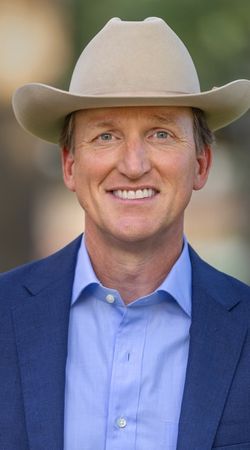Texas gubernatorial election, 2026 (March 3 Democratic primary)
|
← 2022
|
| Governor of Texas |
|---|
| Democratic primary Republican primary General election |
| Election details |
| Filing deadline: December 8, 2025 |
| Primary: March 3, 2026 Primary runoff: May 26, 2026 General: November 3, 2026 |
| How to vote |
| Poll times:
7 a.m. to 7 p.m. |
| Race ratings |
Sabato's Crystal Ball: Safe Republican Inside Elections: Solid Republican |
| Ballotpedia analysis |
| Federal and state primary competitiveness State executive elections in 2026 Impact of term limits in 2026 State government trifectas State government triplexes Ballotpedia's Election Analysis Hub, 2026 |
| Texas executive elections |
| Governor Lieutenant Governor |
A Democratic Party primary took place on March 3, 2026, in Texas to determine which candidate would earn the right to run as the party's nominee in the state's gubernatorial election on November 3, 2026.
Gina Hinojosa advanced from the Democratic primary for Governor of Texas.
This page focuses on Texas' Democratic Party gubernatorial primary. For more in-depth information on Texas' Republican gubernatorial primary and the general election, see the following pages:
Candidates and election results
Democratic primary election
Democratic primary for Governor of Texas
The following candidates ran in the Democratic primary for Governor of Texas on March 3, 2026.
Candidate | % | Votes | ||
| ✔ |  | Gina Hinojosa | 59.9 | 1,012,218 |
 | Chris Bell | 9.6 | 163,007 | |
 | Angela Villescaz  | 6.5 | 109,308 | |
| Patricia Abrego | 5.5 | 92,840 | ||
 | Andrew White  | 5.3 | 89,383 | |
 | Bobby Cole | 5.2 | 87,284 | |
 | Jose Navarro Balbuena | 2.9 | 48,395 | |
| Carlton Hart | 2.7 | 45,559 | ||
 | Zach Vance | 2.5 | 41,637 | |
| Total votes: 1,689,631 | ||||
 = candidate completed the Ballotpedia Candidate Connection survey. = candidate completed the Ballotpedia Candidate Connection survey. | ||||
| If you are a candidate and would like to tell readers and voters more about why they should vote for you, complete the Ballotpedia Candidate Connection Survey. | ||||
Do you want a spreadsheet of this type of data? Contact our sales team. | ||||
Withdrawn or disqualified candidates
- Faizan Syed (D)
- Meagan Tehseldar (D)
- Nick Pappas (D)
Candidate profiles
This section includes candidate profiles that may be created in one of two ways: either the candidate completed Ballotpedia's Candidate Connection survey, or Ballotpedia staff may compile a profile based on campaign websites, advertisements, and public statements after identifying the candidate as noteworthy. For more on how we select candidates to include, click here.

Party: Democratic Party
Incumbent: No
Submitted Biography: "Angela Villescaz was born in Dallas,TX and grew up in Uvalde. Villescaz is the founder of Fierce Madres, a gun violence prevention organization founded in the aftermath of the Robb Elementary shooting. Employed at Cirkiel Law Group as a professional education advocate. Her professional experience includes research for the Texas Association Against Sexual Assault (TAASA.) She has served as a survivor advocate for Domestic Violence, Sexual Assault and Human Trafficking for SAFE Alliance and the East Texas Crisis Center."
![]()
This information was current as of the candidate's run for Governor of Texas in 2026.

Party: Democratic Party
Incumbent: No
Submitted Biography: "I'm a 30 year entrepreneur running as an Independent Democrat to change the way things get done in Austin. We have to work together if we are going to solve our most complicated problems. I'm a team builder and ready for the job. Greg Abbott is undefeated running against progressive Democrats. He beat Wendy, Lupe and even Beto. If we want to end Greg's war on women, immigrants and, even, public education, It's time to try something. I'm a balanced candidate who can win in November and actually make progress on our most critical issues. That's why I'm running."
![]()
This information was current as of the candidate's run for Governor of Texas in 2026.
Voting information
- See also: Voting in Texas
Campaign finance
The section and tables below contain data from financial reports submitted to state agencies. The data is gathered and made available by Transparency USA.
Election analysis
Click the tabs below to view information about demographics, past elections, and partisan control of the state.
- Presidential elections - Information about presidential elections in the state.
- Statewide elections - Information about recent U.S. Senate and gubernatorial elections in the state.
- State partisanship - The partisan makeup of the state's congressional delegation and state government.
- Demographics - Information about the state's demographics and how they compare to the country as a whole.
Cook PVI by congressional district
2024 presidential results by 2026 congressional district lines
| District | Kamala Harris | Donald Trump |
|---|---|---|
| Texas' 1st | 26.6% | 71.9% |
| Texas' 2nd | 35.9% | 62.0% |
| Texas' 3rd | 37.5% | 60.1% |
| Texas' 4th | 37.5% | 60.5% |
| Texas' 5th | 39.6% | 58.6% |
| Texas' 6th | 37.2% | 60.6% |
| Texas' 7th | 63.9% | 33.9% |
| Texas' 8th | 39.3% | 58.8% |
| Texas' 9th | 46.6% | 51.6% |
| Texas' 10th | 39.9% | 57.6% |
| Texas' 11th | 33.1% | 64.7% |
| Texas' 12th | 38.9% | 58.9% |
| Texas' 13th | 26.0% | 71.9% |
| Texas' 14th | 37.4% | 60.7% |
| Texas' 15th | 51.4% | 46.8% |
| Texas' 16th | 68.1% | 28.8% |
| Texas' 17th | 39.7% | 57.8% |
| Texas' 18th | 81.2% | 17.1% |
| Texas' 19th | 25.4% | 72.5% |
| Texas' 20th | 68.7% | 28.8% |
| Texas' 21st | 38.6% | 59.0% |
| Texas' 22nd | 38.0% | 60.0% |
| Texas' 23rd | 44.8% | 53.0% |
| Texas' 24th | 39.2% | 58.5% |
| Texas' 25th | 40.4% | 57.7% |
| Texas' 26th | 36.9% | 60.7% |
| Texas' 27th | 39.1% | 58.8% |
| Texas' 28th | 60.6% | 37.4% |
| Texas' 29th | 71.8% | 26.4% |
| Texas' 30th | 77.0% | 21.2% |
| Texas' 31st | 37.7% | 59.7% |
| Texas' 32nd | 42.1% | 55.7% |
| Texas' 33rd | 71.0% | 26.7% |
| Texas' 34th | 51.7% | 46.3% |
| Texas' 35th | 46.7% | 51.0% |
| Texas' 36th | 39.4% | 58.9% |
| Texas' 37th | 78.8% | 18.1% |
| Texas' 38th | 37.5% | 60.5% |
| Source: The Downballot | ||
2016-2024
How a state's counties vote in a presidential election and the size of those counties can provide additional insights into election outcomes at other levels of government including statewide and congressional races. Below, four categories are used to describe each county's voting pattern over the 2016, 2020, and 2024 presidential elections: Solid, Trending, Battleground, and New. Click [show] on the table below for examples:
| County-level voting pattern categories | |||||||
|---|---|---|---|---|---|---|---|
| Democratic | |||||||
| Status | 2016 | 2020 | 2024 | ||||
| Solid Democratic | D | D | D | ||||
| Trending Democratic | R | D | D | ||||
| Battleground Democratic | D | R | D | ||||
| New Democratic | R | R | D | ||||
| Republican | |||||||
| Status | 2016 | 2020 | 2024 | ||||
| Solid Republican | R | R | R | ||||
| Trending Republican | D | R | R | ||||
| Battleground Republican | R | D | R | ||||
| New Republican | D | D | R | ||||
Following the 2024 presidential election, 41.8% of Texans lived in one of the state's 224 Solid Republican counties, which voted for the Republican presidential candidate in every election from 2016 to 2024, and 41.6% lived in one of 11 Solid Democratic counties. Overall, Texas was Solid Republican, having voted for Donald Trump (R) in 2016, Donald Trump (R) in 2020, and Donald Trump (R) in 2024. Use the table below to view the total number of each type of county in Texas following the 2024 election as well as the overall percentage of the state population located in each county type.
| Texas county-level statistics, 2024 | |||||||
|---|---|---|---|---|---|---|---|
| Solid Republican | 224 | 41.8% | |||||
| Solid Democratic | 11 | 41.6% | |||||
| Battleground Republican | 2 | 9.4% | |||||
| New Republican | 8 | 5.7% | |||||
| Trending Democratic | 1 | 0.9% | |||||
| Trending Republican | 8 | 0.5% | |||||
| Total voted Democratic | 12 | 42.5% | |||||
| Total voted Republican | 242 | 57.5% | |||||
Historical voting trends
Texas presidential election results (1900-2024)
- 16 Democratic wins
- 15 Republican wins
| Year | 1900 | 1904 | 1908 | 1912 | 1916 | 1920 | 1924 | 1928 | 1932 | 1936 | 1940 | 1944 | 1948 | 1952 | 1956 | 1960 | 1964 | 1968 | 1972 | 1976 | 1980 | 1984 | 1988 | 1992 | 1996 | 2000 | 2004 | 2008 | 2012 | 2016 | 2020 | 2024 |
|---|---|---|---|---|---|---|---|---|---|---|---|---|---|---|---|---|---|---|---|---|---|---|---|---|---|---|---|---|---|---|---|---|
| Winning Party | D | D | D | D | D | D | D | R | D | D | D | D | D | R | R | D | D | D | R | D | R | R | R | R | R | R | R | R | R | R | R | R |
This section details the results of the five most recent U.S. Senate and gubernatorial elections held in the state.
U.S. Senate elections
The table below details the vote in the five most recent U.S. Senate races in Texas.
Gubernatorial elections
- See also: Governor of Texas
The table below details the vote in the five most recent gubernatorial elections in Texas.
- See also: Party control of Texas state government
Congressional delegation
The table below displays the partisan composition of Texas' congressional delegation as of February 2026.
| Congressional Partisan Breakdown from Texas | |||
|---|---|---|---|
| Party | U.S. Senate | U.S. House | Total |
| Democratic | 0 | 13 | 13 |
| Republican | 2 | 25 | 27 |
| Independent | 0 | 0 | 0 |
| Vacancies | 0 | 0 | 0 |
| Total | 2 | 38 | 40 |
State executive
The table below displays the officeholders in Texas' top four state executive offices as of October 2025.
| Office | Officeholder |
|---|---|
| Governor | |
| Lieutenant Governor | |
| Secretary of State | |
| Attorney General |
State legislature
Texas State Senate
| Party | As of October 2025 | |
|---|---|---|
| Democratic Party | 11 | |
| Republican Party | 18 | |
| Other | 0 | |
| Vacancies | 2 | |
| Total | 31 | |
Texas House of Representatives
| Party | As of October 2025 | |
|---|---|---|
| Democratic Party | 62 | |
| Republican Party | 88 | |
| Other | 0 | |
| Vacancies | 0 | |
| Total | 150 | |
Trifecta control
Texas Party Control: 1992-2025
Three years of Democratic trifectas • Twenty-three years of Republican trifectas
Scroll left and right on the table below to view more years.
| Year | 92 | 93 | 94 | 95 | 96 | 97 | 98 | 99 | 00 | 01 | 02 | 03 | 04 | 05 | 06 | 07 | 08 | 09 | 10 | 11 | 12 | 13 | 14 | 15 | 16 | 17 | 18 | 19 | 20 | 21 | 22 | 23 | 24 | 25 |
|---|---|---|---|---|---|---|---|---|---|---|---|---|---|---|---|---|---|---|---|---|---|---|---|---|---|---|---|---|---|---|---|---|---|---|
| Governor | D | D | D | R | R | R | R | R | R | R | R | R | R | R | R | R | R | R | R | R | R | R | R | R | R | R | R | R | R | R | R | R | R | R |
| Senate | D | D | D | D | D | R | R | R | R | R | R | R | R | R | R | R | R | R | R | R | R | R | R | R | R | R | R | R | R | R | R | R | R | R |
| House | D | D | D | D | D | D | D | D | D | D | D | R | R | R | R | R | R | R | R | R | R | R | R | R | R | R | R | R | R | R | R | R | R | R |
The table below details demographic data in Texas and compares it to the broader United States as of 2023.
| Demographic Data for Texas | ||
|---|---|---|
| Texas | United States | |
| Population | 29,145,505 | 331,449,281 |
| Land area (sq mi) | 261,257 | 3,531,905 |
| Race and ethnicity** | ||
| White | 53.9% | 63.4% |
| Black/African American | 12.2% | 12.4% |
| Asian | 5.3% | 5.8% |
| Native American | 0.6% | 0.9% |
| Pacific Islander | 0.3% | 0.4% |
| Other (single race) | 8.6% | 6.6% |
| Multiple | 19.2% | 10.7% |
| Hispanic/Latino | 39.5% | 19% |
| Education | ||
| High school graduation rate | 85.7% | 89.4% |
| College graduation rate | 33.1% | 35% |
| Income | ||
| Median household income | $76,292 | $78,538 |
| Persons below poverty level | 13.8% | 12.4% |
| Source: population provided by U.S. Census Bureau, "Decennial Census" (2020). Other figures provided by U.S. Census Bureau, "American Community Survey" (5-year estimates 2018-2023). | ||
| **Note: Percentages for race and ethnicity may add up to more than 100 percent because respondents may report more than one race and the Hispanic/Latino ethnicity may be selected in conjunction with any race. Read more about race and ethnicity in the census here. | ||
State profile
| Demographic data for Texas | ||
|---|---|---|
| Texas | U.S. | |
| Total population: | 27,429,639 | 316,515,021 |
| Land area (sq mi): | 261,232 | 3,531,905 |
| Race and ethnicity** | ||
| White: | 74.9% | 73.6% |
| Black/African American: | 11.9% | 12.6% |
| Asian: | 4.2% | 5.1% |
| Native American: | 0.5% | 0.8% |
| Pacific Islander: | 0.1% | 0.2% |
| Two or more: | 2.5% | 3% |
| Hispanic/Latino: | 38.4% | 17.1% |
| Education | ||
| High school graduation rate: | 81.9% | 86.7% |
| College graduation rate: | 27.6% | 29.8% |
| Income | ||
| Median household income: | $53,207 | $53,889 |
| Persons below poverty level: | 19.9% | 11.3% |
| Source: U.S. Census Bureau, "American Community Survey" (5-year estimates 2010-2015) Click here for more information on the 2020 census and here for more on its impact on the redistricting process in Texas. **Note: Percentages for race and ethnicity may add up to more than 100 percent because respondents may report more than one race and the Hispanic/Latino ethnicity may be selected in conjunction with any race. Read more about race and ethnicity in the census here. | ||
Presidential voting pattern
- See also: Presidential voting trends in Texas
Texas voted Republican in all seven presidential elections between 2000 and 2024.
Pivot Counties (2016)
Ballotpedia identified 206 counties that voted for Donald Trump (R) in 2016 after voting for Barack Obama (D) in 2008 and 2012. Collectively, Trump won these Pivot Counties by more than 580,000 votes. Of these 206 counties, one is located in Texas, accounting for 0.5 percent of the total pivot counties.[1]
Pivot Counties (2020)
In 2020, Ballotpedia re-examined the 206 Pivot Counties to view their voting patterns following that year's presidential election. Ballotpedia defined those won by Trump won as Retained Pivot Counties and those won by Joe Biden (D) as Boomerang Pivot Counties. Nationwide, there were 181 Retained Pivot Counties and 25 Boomerang Pivot Counties. Texas had one Retained Pivot County, 0.55 percent of all Retained Pivot Counties.
More Texas coverage on Ballotpedia
- Elections in Texas
- United States congressional delegations from Texas
- Public policy in Texas
- Endorsers in Texas
- Texas fact checks
- More...
See also
| Texas | State Executive Elections | News and Analysis |
|---|---|---|
|
|
|
|
External links
Footnotes
- ↑ The raw data for this study was provided by Dave Leip of Atlas of U.S. Presidential Elections.









